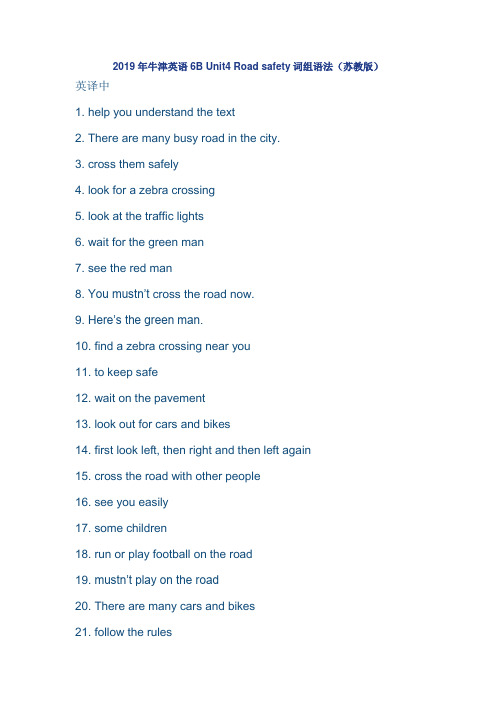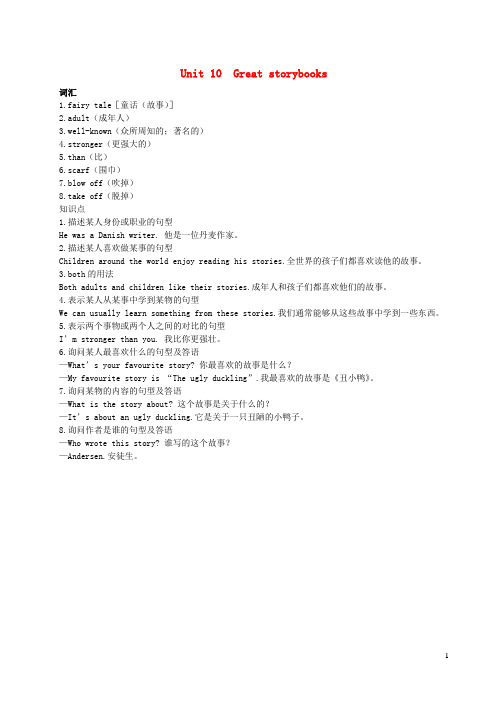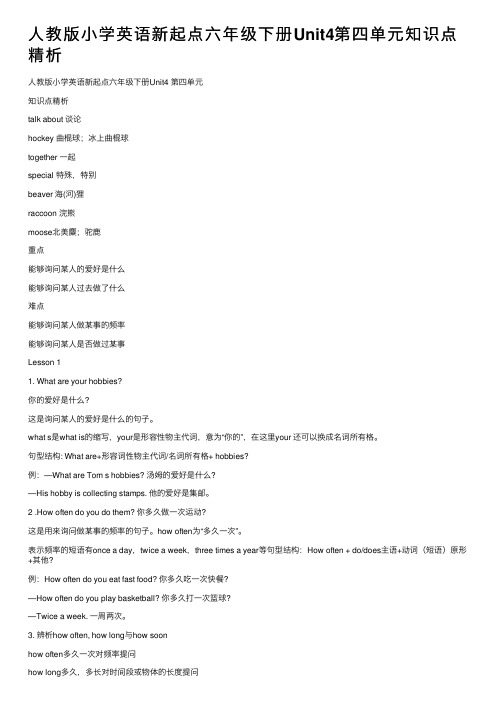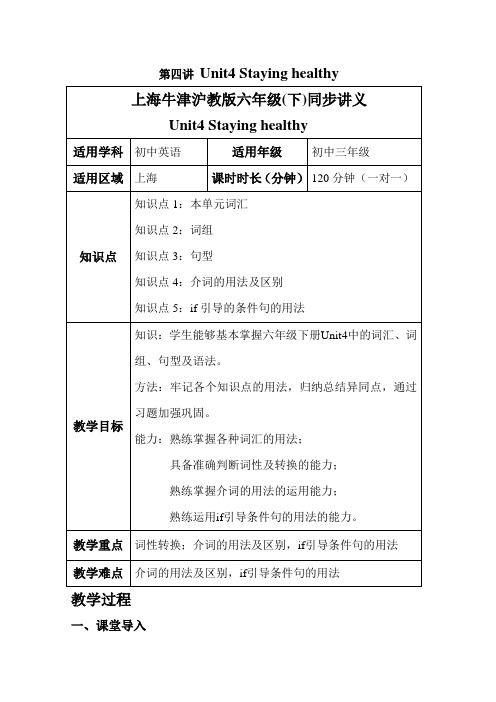六年级英语语法第四单元词汇语法解析素材1牛津版2
六年级英语语法第四单元词汇语法解析素材(2)牛津版

Unit 4 ReadingWord box1. interview v. 采访Kitty is interviewing Samuel Han.基蒂正在采访赛谬尔韩先生。
2. find out 查明,弄清楚Kitty wants to find out if the doctor likes his job. 基蒂想知道这位医生是否喜欢自己的职业。
3. if conj. 是否Kitty wants to find out if the doctor likes his job. 基蒂想知道这位医生是否喜欢自己的职业。
4. finish v. 结束When do you usually finish work?您通常几点结束工作?5. age n. 年龄What’s your age?= How old are you?你的年龄有多大?6. worker n. 工人I would like to be a worker.我想成为工人。
Language focus1. 名词复数man—menwoman—womenfireman—firemenpostman—postmenpoliceman—policemenpolicewoman—policewomen2. a用在辅音前,an用在元音前a doctoran English teachera housean hour3. I’m forty-two years old.…years old…岁4. I usually start work at half past eight in the morning.(1)at 后接具体点钟(2)in the morningin the afternoonin the evening5. 你是做什么工作的?What’s your job?What job do you do?What are you?What’s Miss Huo’s job?What job does Miss Huo do? What’s Miss Huo?6. would like to do=want to do 想要去做would like to be = want to be 想要成为。
新译林版六年级英语unit-4-知识点

Fpg
Fpg 新譯林版六年級英語unit 4 知識點
短語
1.Look for 尋找
2.wait for 等待
3.cross the road 穿過馬路
4.look out of 當心提防
5.road safety 馬路安全
6.many busy road 許多繁忙の馬路
7.in the city 在城市裏
8.a zebra crossing 斑馬線
9.cross safety 安全通過10.the green man 綠燈
11.the red man 紅燈12.on the pavement 在人行道上
13.look left 向左看14.look right 向右看
15.some children 一些孩子16 follow the rules 遵守規則
17.stay safe 保持安全18.get to 到達
19.take the bus 乘公共汽車20.get on the bus 上公共汽車
21.so many cars 如此多の汽車22.go on 繼續
23.drive on the right side of 靠右行
語法
1.can will shall may must could would should 等情態動詞是一種本身
有一定の詞義,表示說話人の態度和語氣の動詞。
它不能單獨使用,只能和其他動詞一起構成謂語。
特別注意情態動詞後面只能跟動詞原形。
can 表示個人能力或客觀上有可能。
may表示允許,請求或可能性must 意為必須,語氣比較強硬
2.含情態動詞の陳述句,在變為一般疑問句時,把它調到句首;否
定句在情態動詞後加not.。
牛津译林版英语六年级下册第四单元词组语法

2019年牛津英语6B Unit4 Road safety词组语法(苏教版)英译中1. help you understand the text2. There are many busy road in the city.3. cross them safely4. look for a zebra crossing5. look at the traffic lights6. wait for the green man7. see the red man8. You mustn’t cross the road now.9. Here’s the green man.10. find a zebra crossing near you11. to keep safe12. wait on the pavement13. look out for cars and bikes14. first look left, then right and then left again15. cross the road with other people16. see you easily17. some children18. run or play football on the road19. mustn’t play on the road20. There are many cars and bikes21. follow the rules22. stay safe on the road23. to cross a busy road safely24. before we cross the road25. What must you do to cross the road safely?26. What must you not do on the road?27. run quickly on the road28. There he is!29. in the UK30. drive on the left side of the road31. except Hong Kong and Macau32. drive on the right side of the road33. go to see their aunt34. How do we get to your house?35. take the bus36. get on the bus37. There are so many cars on the road.38. They’re going fast.39. Why does the bus stop here?40. The bus goes on.41. There aren’t any traffic lights here.42. Why is the bus stopping again?43. some elephants44. stop and wait45. go to see the doctor46. You’re sick.47. classroom rules48. keep your desk clean and tidy49. play ball games50. talk loudly51. listen to your teachers in class语法(Grammar)1. 情态助动词can, must的用法:can: 能,可以。
六年级英语下册Module4Unit10Greatstorybooks重点知识梳理牛津沪教版

Unit 10 Great storybooks词汇1.fairy tale[童话(故事)]2.adult(成年人)3.well-known(众所周知的;著名的)4.stronger(更强大的)5.than(比)6.scarf(围巾)7.blow off(吹掉)8.take off(脱掉)知识点1.描述某人身份或职业的句型He was a Danish writer. 他是一位丹麦作家。
2.描述某人喜欢做某事的句型Children around the world enjoy reading his stories.全世界的孩子们都喜欢读他的故事。
3.both的用法Both adults and children like their stories.成年人和孩子们都喜欢他们的故事。
4.表示某人从某事中学到某物的句型We can usually learn something from these stories.我们通常能够从这些故事中学到一些东西。
5.表示两个事物或两个人之间的对比的句型I’m stronger than you. 我比你更强壮。
6.询问某人最喜欢什么的句型及答语—What’s your favourite story? 你最喜欢的故事是什么?—My favourite story is “The ugly duckling”.我最喜欢的故事是《丑小鸭》。
7.询问某物的内容的句型及答语—What is the story about? 这个故事是关于什么的?—It’s about an ugly duckling.它是关于一只丑陋的小鸭子。
8.询问作者是谁的句型及答语—Who wrote this story? 谁写的这个故事?—Andersen.安徒生。
1。
人教版小学英语新起点六年级下册Unit4第四单元知识点精析

⼈教版⼩学英语新起点六年级下册Unit4第四单元知识点精析⼈教版⼩学英语新起点六年级下册Unit4 第四单元知识点精析talk about 谈论hockey 曲棍球;冰上曲棍球together ⼀起special 特殊,特别beaver 海(河)狸raccoon 浣熊moose北美麋;驼⿅重点能够询问某⼈的爱好是什么能够询问某⼈过去做了什么难点能够询问某⼈做某事的频率能够询问某⼈是否做过某事Lesson 11. What are your hobbies?你的爱好是什么?这是询问某⼈的爱好是什么的句⼦。
what s是what is的缩写,your是形容性物主代词,意为“你的”,在这⾥your 还可以换成名词所有格。
句型结构: What are+形容词性物主代词/名词所有格+ hobbies?例:—What are Tom s hobbies? 汤姆的爱好是什么?—His hobby is collecting stamps. 他的爱好是集邮。
2 .How often do you do them? 你多久做⼀次运动?这是⽤来询问做某事的频率的句⼦。
how often为“多久⼀次”。
表⽰频率的短语有once a day,twice a week,three times a year等句型结构:How often + do/does主语+动词(短语)原形+其他?例:How often do you eat fast food? 你多久吃⼀次快餐?—How often do you play basketball? 你多久打⼀次篮球?—Twice a week. ⼀周两次。
3. 辨析how often, how long与how soonhow often多久⼀次对频率提问how long多久,多长对时间段或物体的长度提问how soon多久以后对“in+时间段"提问,常⽤于⼀般将来时的句⼦中例:—How often does he come here? 他(每隔)多久来这⾥⼀次?—Once a month. 每⽉⼀次。
译林版六年级下册英语第四单元知识点整理

6下 Unit4 Road safety一、四会单词road马路,公路 must必须 safe安全的 follow遵守 light灯二、三会单词safety安全 cross穿过,穿行 safely安全地 zebra crossing斑马线pavement人行道 look out of当心,提防 easily容易地 rule规则 stay保持三、短语积累1. road safety 道路安全2. many busy roads 许多繁忙的道路3.in the city在城市里4. cross the road safely 安全地过马路5. keep safe 保持安全6. look at the traffic lights 看交通灯7. look left看左边8. wait on the pavement 在人行道上等待9. see the red man 看红灯 10.some children 一些孩子们11. look right 看右边 12. see you easily很容易看见你13. a child 一个孩子 14. wait for the green man 等待绿灯15. play on the road 在路上玩 16. follow the rules 遵守规则17. wait for me 等我 18. mustn’t walk 绝不能行走19. wait for the bus 等待公交车20. the other people 其他人21. except me 除了我 22. except Macau除了澳门23. take the bus 乘车 24. get on the bus 上车25. get off the bus 下车 26. so many cars 如此多的车27. go fast 快点去 28. so much water 如此多的水29. go on 继续,继续前进 30. run fast 跑得快31. must stop 必须停下来 32. go to see the doctor 去看医生33. classroom rules 班级规则 34. play ball games 玩球类游戏35. a red light 一个红灯 36. look at the green light 看绿灯37. you’re sick 你生病了 38. talk loudly 大声地谈论39. cross a busy road safely安全地通过一条繁忙的马路40. also cross the road with other people也可以和其他人一起过马路41. look out for cars and bikes 小心小汽车和自行车42. many cars and bikes 许多小汽车和自行车43. stay safe on the road 在路上保持安全44. must look for a zebra crossing 必须寻找一条斑马线45. must look for a zebra crossing必须寻找一条斑马线46. find a zebra crossing找到一条斑马线47. mustn’t run quickly 绝不能快速地跑步48. the left side of the road 马路的左边49. drive on the right side of the road 马路的右边驾驶50. go to see their aunt去看他们的阿姨51. at the bus stop在公交车站52. keep your desk clean 保持桌子干净53. listen t o your teachers in class 在课堂上听老师二、重点句型:1.你如何安全地过马路?我必须寻找一条斑马线。
上海牛津沪教版六年级(下)同步讲义unit4

第四讲Unit4 Staying healthy教学过程一、课堂导入教师讲述一个与本节课题目有关的英文小故事,引出今日所要讲解的知识点,然后让学生简单梳理一下所涉及的问题,带着问题学习本节课的内容。
二、复习预习教师引导学生复习上节课学的重点内容,检测单词的用法,(以提问、回顾的形式进行),针对上节课的作业进行讲评、订正、答疑,并通过英文小故事导入本节课所要学习的新知识。
三、知识讲解1. 知识点一:重点单词1)indoor ['ɪndɔː]【词性】adj.【词义】室内的,户内的【易混淆点】inside adj. 内部的,里面的【经典例句】There is a big indoor swimming pool in this hotel.这家旅馆内有一个大的室内游泳馆。
2)outdoor ['aʊtdɔː]【词性】adj.【词义】室外的,户外的【易混淆点】outside adj.外部的,在外面的【经典例句】They needed the outside help.他们需要来自外界的帮助。
3)really ['riːəli]【词性】adv.【词义】真正地,的确【易混淆点】surely adv.真正地【经典例句】I really care about the students in my class.我的确喜欢这个班里的学生。
4)forget [fə'get]【词性】v.【词义】忘记【易混淆点】remember n.记的【经典例句】You'd better forget for the moment.你最好暂时忘掉吧。
5)playground [ 'pleigraʊnd ]【词性】n.【词义】操场【易混淆点】field n.场地【经典例句】The city has several playgrounds for children.这座城市有好几个儿童游乐场。
新沪教牛津版六年级下册小学英语 Module 4 单元知识点小结

Module Things we enjoy一、核心词汇1. 名词adult成年人 scarf 围巾(复数scarves或scarfs)turkey火鸡 jack-o’-lantern 南瓜灯pea 豌豆pod豆荚bullet子弹roof屋顶yard院子2. 动词hit碰撞;撞击3. 形容词well-known众所周知的;著名的Western 西方的 bright明亮的;鲜艳的excited兴奋的lazy懒惰的4. 副词forever 永远5. 介词than 比6. 其他stronger更强大的bigger更大的7. 短语fairy tale童话(故事)blow off 吹掉take off 脱掉laugh at 嘲笑 see the world 见世面one by one 一个接一个地look out of往外看二、拓展词汇writer 作者festival 节日ground 地面三、核心句型1. He was a Danish writer. 他是一个丹麦作家。
解读:这是介绍某人身份或职业的句型。
举一反三: The Grimm brothers were German writers. 格林兄弟是德国作家。
Mo Yan is a Chinese writer. 莫言是一位中国作家。
2. Children around the world enjoy reading his stories. 全世界的孩子们喜欢阅读他的故事。
解读:此句是描述某人喜欢做某事的句型。
举一反三: I enjoy a chat with a friend. 我喜欢与朋友在一起聊天。
3. Both adults and children like their stories. 成年人和孩子们都喜欢他们的故事。
解读: both意为“两者都”,常见短语为both … and …举一反三: Both Li Lei and Zhao Xue are students. 李磊和赵雪都是学生。
2022-2023学年上海牛津版英语六年级上册Unit 4 知识点梳理

6AU4 知识点梳理1.policeman, postman, fireman (pl. man→men)2.v. + -er = a job 职业或身份e.g. drive – driver; sing – singer; dance – dancer; work – worker; wait – waiter; teach – teacher; think – thinker(思想家); help – helper; read – readercook – cooker?厨师炊具-iste.g. dental – dentist; art – artist; science – scientist-ore.g. visit – visitor; act – actor; invent – inventor (发明家)3.assistant (n.) = helperassist (v.) = help 帮助assist sb. with sth. = help sb. with sth.e.g. He always assists me with my work.help sb. (to) do sth. = assist sb. in doing sth.assistance (n.) = helpe.g. With her assistance, I finished the work on time.4.make sick people better①good – better- the best②make sb. + (adj.)make sb. do sth. 让某人做某事e.g. You can always make me smile.其他使动用法:have/let sb. do sth.keep sb. + (adj.)③people (n.)a. 人(pl): person – persons/peopleb. 民族: = natione.g. There are 56 peoples/nations in China.④sick people = patients5.would like to do sth. = want to do sth.(+) I’d(=would) like to be a policeman.(-) I wouldn’t like to be a policeman.(?) Would you like to be a policeman?A: Yes, I would./ No, I wouldn’t.注意:would 是情态动词,没有三单。
6B Unit 4知识点整理

六年级第二学期牛津英语知识点梳理Unit 4知识点梳理:I 词组1.stay healthy = keep healthy 保持健康2.indoor activities 室内活动3.outdoor activities 室外活动4.like running 喜欢跑步5.enjoy swimming 喜欢游泳6.love sports 喜欢运动7.love playing 喜欢玩8.forget working 忘记工作9.play and work 工作与玩耍10.do puzzles 玩拼图游戏11.go fishing 去钓鱼12.go cycling 去骑车13.go swimming 去游泳14.go on a picnic 去野餐15.watch television 看电视16.see a film 电影17.read a book 看书18.play computer games 玩电脑游戏19.play tennis / badminton 打网球/羽毛球20.play basketball in the playground 在操场上打篮球21.play the piano 弹钢琴22.make a model 制作模型23.have a barbecue 进行一次烧烤24.fly kites 放风筝25.health problem 健康问题26.have a headache 头疼27.have a stomach ache 肚子疼28.have a cold 感冒29.have a fever 发烧30.have a sore throat 喉咙疼31.have toothache 牙疼(注意没有“a”)32.I’m afraid 恐怕(表示婉转语气)33.too much + 不可数名词太多34.too many + 可数名词35.too little+ 不可数名词太少36.too few + 可数名词37.watch too much television 看太多的电视(*watch television for too long)38.watch less television 看少一点电视39.wear enough clothes 穿(着)足够多的衣服40.*put on 穿上41.wear more clothes 穿更多的衣服42.eat too much spicy food 吃更多的辛辣食物43.have exercise 做运动44.once a day 一天一次45.twice a week 一周两次46.three times a month 一个月三次47.go to bed late 晚睡48.go to bed early 早睡49.practise swimming 练习游泳50.*practise doing sth. 练习做某事51.help do the housework 帮助做家务52.*help sb. (to)do sth./ help sb. with sth。
上海牛津英语六年级第二学期笔记U4笔记

15, have a fever / have a cold / have a headache… 否定句:don’t have a fever / have a cold / have a headache… 1)He has a bad cold.改否定句: doesn’t have He ____ ____ a bad cold. 2)He has toothache. 改过去式 had 3)He ____ toothache. 4)He had a cough.一般疑问句 Did have 5)____ he ____ a cough?
1, stay healthy 保持健康 = keep healthy = keep fit
2 healthy a. ---unhealthy--- health n. healthy eg. My grandfather is very ____(health). But my grandmother is unhealthy ____ (health) because she does no exercise. e.g. He is much healthier ______than before because he eats more vegetables. 3 like , love , enjoy 的用法复习 1)I like ____ (go) swimming everyday. But today I like ____ (go) dancing. 2) I always enjoy ____ (watch) TV.
12, work: 1) v. Mary works harder than Peter. 2) n. The work in the office is hard. 变形: working: eg. We shouldn’t forget working.(为了“押韵”) a hard-working woman 一个辛勤工作的女人
6B Unit 4知识点整理

六年级第二学期牛津英语知识点梳理Unit 4知识点梳理:I 词组1.stay healthy = keep healthy 保持健康2.indoor activities 室内活动3.outdoor activities 室外活动4.like running 喜欢跑步5.enjoy swimming 喜欢游泳6.love sports 喜欢运动7.love playing 喜欢玩8.forget working 忘记工作9.play and work 工作与玩耍10.do puzzles 玩拼图游戏11.go fishing 去钓鱼12.go cycling 去骑车13.go swimming 去游泳14.go on a picnic 去野餐15.watch television 瞧电视16.see a film 电影17.read a book 瞧书18.play computer games 玩电脑游戏19.play tennis / badminton 打网球/羽毛球20.play basketball in the playground 在操场上打篮球21.play the piano 弹钢琴22.make a model 制作模型23.have a barbecue 进行一次烧烤24.fly kites 放风筝25.health problem 健康问题26.have a headache 头疼27.have a stomach ache 肚子疼28.have a cold 感冒29.have a fever 发烧30.have a sore throat 喉咙疼31.have toothache 牙疼(注意没有“a”)32.I’m afraid 恐怕(表示婉转语气)33.too much + 不可数名词太多34.too many + 可数名词35.too little+ 不可数名词太少36.too few + 可数名词37.watch too much television 瞧太多得电视(*watch television for too long)38.watch less television 瞧少一点电视39.wear enough clothes 穿(着)足够多得衣服40.*put on 穿上41.wear more clothes 穿更多得衣服42.eat too much spicy food 吃更多得辛辣食物43.have exercise 做运动44.once a day 一天一次45.twice a week 一周两次46.three times a month 一个月三次47.go to bed late 晚睡48.go to bed early 早睡49.practise swimming 练习游泳50.*practise doing sth、练习做某事51.help do the housework 帮助做家务52.*help sb、(to) do sth、/ help sb、with sth、帮助某人做某事II、词性转换1.act (v、)—activity (n、) activities (pl、) *active (a、)e、g、We take part in all kinds of activities、He is very active in class、2.health (n、) — healthy (adj、) —unhealthy (a、)e、g、Health is the most important thing、You should eat healthy food、3.real (adj、) — really (adv、)e、g、It’s really cold today、He who doesn't reach the Great Wall is not a real man 、4.tooth (n、)—teeth (pl、) —toothachee、g、You eat too much sweet food, so you always have toothache、5.fun (n、)—* funny (a、)e、g、The children had fun at the beach yesterday、It’s a funny story、6.many/ much (a、ad、) —moree、g、You should drink more water、7.little—less; few—fewere、g、You should watch less televsion、8.one—once two – twicee、g、I go to school once a week、III、语言点/句型1、*stay healthystay 在这里意为“保持”,相当于keep, 后接形容词stay with his cousin “逗留“*health 名词healthy 形容词2、like / love / enjoy + doing 其中enjoy 后面只能加doingenjoy 喜爱,享受……乐趣* enjoy oneself = have a good timelike to do / like doing前者强调某一具体行为,后者则强调抽象概念或某一类事物e、g、I like to read his novel、I like reading、3、forget doing sth、忘记做过某事*forget to do sth、忘记去做某事*remember to do sth、记得去做某事*remember doing sth、记得做过某事4、really adv、真正地= trulye、g、I really enjoy watching cartoon、real – reallyIt’s really cold today、He who doesn't reach the Great Wall is not a real man 、5、fun n、--- funny adj、have fun / have a lot of fun What fun it is !like doingfavourite adj、like sth bestI like doing puzzles best、Doing puzzles is my favourite 、7、用动名词来表述一些活动得名称e、g、swimming , making a model8、--- Why do I always have a headache?--- It’s because you watch too much television,I’m afraid、注:Why 提问要用because 回答。
六年级英语上册第四单元知识点小结(K12教育文档)

六年级英语上册第四单元知识点小结(word版可编辑修改)编辑整理:尊敬的读者朋友们:这里是精品文档编辑中心,本文档内容是由我和我的同事精心编辑整理后发布的,发布之前我们对文中内容进行仔细校对,但是难免会有疏漏的地方,但是任然希望(六年级英语上册第四单元知识点小结(word版可编辑修改))的内容能够给您的工作和学习带来便利。
同时也真诚的希望收到您的建议和反馈,这将是我们进步的源泉,前进的动力。
本文可编辑可修改,如果觉得对您有帮助请收藏以便随时查阅,最后祝您生活愉快业绩进步,以下为六年级英语上册第四单元知识点小结(word版可编辑修改)的全部内容。
直击考点一、重点单词和短语pen pal笔友hobby爱好idea主意studies学习(第三人称单数)puzzle谜语hiking徒步旅行forest森林gift礼物sometimes有时angry,生气shout大喊bushy浓密的have to不得不get … from…,从。
..得到.。
reading books读书read stories读故事do kung fu练功夫play sports 进行体育运动play the pipa 弹琵琶climb mountains爬山listen to music听音乐sing English songs 唱英文歌fly kites放风筝on a farm在一个农场里write an e mail to给。
写封电子邮件on the playground在运动场上六live in住在.。
按要求写单词二、按要求写单词have(第三人称单数)has do(三单形式)does do (否定形式)don'tdoes (否定形式)doesn't like (三单形式)likes he( 所有格形式)histalk(动词—ing形式)talking hobby(三单形式)hobbies story(三单形式) storiesread(三单形式)reads live(三单形式)lives swim动词—ing形式) swimmingdo动词—ing形式) doing sing动词-ing形式) singing go动词-ing形式) goingteach动词-ing形式)teaching also(同义词)too play动词-ing形式) playing student(复数)students dance动词—ing形式)dancing write动词-ing形式) writing puzzle(复数)puzzles hike动词-ing形式) hiking learn动词-ing形式) learningfriend(复数)friends cook(三单形式)cooks study(三单形式)studiesgo (三单形式)goes teach(三单形式)teaches different(反义词)samemake(三单形式)makes talk (三单形式)talks love (三单形式)lovessleep(三单形式)sleeps let(三单形式)lets sing(三单形式)singsdance (三单形式)dances sang (原形)sing was(原形)is/amthrew(原形)throw looked(原形look did(原形)do/does true(反义词)false三、重点句型分析1。
六年级英语下册第四单元重点知识梳理

Unit 4Road safety单元知识梳理重点单词road 马路、公路must 必须safe 安全的safety 安全safely 安全地cross 穿过,穿行follow 遵守pavement 人行道rule 规则light 灯重点词组road safety 道路安全look for 寻找(强调过程)zebra crossing斑马线,人行横道traffie lights 交通灯wait for 等待green/red man 绿/红灯keep/stay safe 保持安全on the pavement 在人行道上look out for 当心,提防look left/nght 左/右看看other people 其他人follow the rules 遵守规则go to see 去看看get to .. 到达……take the bus 乘公共汽车get on/off上/下车重点句子1You must look for a zebra crossing.你必须找一条斑马线2 You must look at the traffic lights and wait for the green man. 你必须看交通灯,等绿灯。
3 To keep safe, you can wait on the pavement and look out for the cars and bikes. 为保证安全,你可以在人行道上等并且当心小汽车和自行车。
4 You must first look left, then right and then left again.你必须先看左边,然后看右边再看左边5 How do we get to your house? 我们怎样才能到你的房子?语法点拨1 本单元重点学习情态动词can 和must。
其他情态动词还有may、need、should would、could 等。
牛津版六年级上册Unit 4 知识点总结

Unit 4 知识点总结【单词】neighbour, son, daughter, noisy, owl, dig, make noise child (单数小孩) ——children(复数孩子们)noise(名词不可数噪音)——noisy(形容词吵闹的)【过去式】do——did play——playedam/is——was are——were live——lived make——made can——could say——said have——had dig——dug【短语】1.play table tennis 打乒乓球2.play chess 下国际象棋3.in the forest4.in the tree 不是树上长的on the tree 树上长的5.under the tree6.make a lot of noise7.say hello to ... 向某人问好8.talk to ... 和......说话9.go out 出去10.have fun together 一起玩儿的很开心11.very well 非常好quite well 十分好【句型】1.Did you play with(和......玩) Sam last weekend? (助动词do,did后加动词原形)Yes, I did.No, I didn’t.2.Who are your neighbours?The Greens are my neighbours.The Wus are my neighbours.3.I played with Mike and Nancy last weekend.4.How well(多大程度)do you know your neighbours?【语法】1.the + 姓氏+ s 表示......一家人the Greens 格林一家the Wus 吴一家2.be from... 来自......They’re from the US.3.play chess with...和......下国际象棋Did you play with Sam last weekend?Yes, I did. I played chess with him in my home.4.stop + 动词ingPlease stop making noise at night.5.Let’s + 动词原形表示提建议让我们做......吧Let’s dig a hole and sleep in it.。
- 1、下载文档前请自行甄别文档内容的完整性,平台不提供额外的编辑、内容补充、找答案等附加服务。
- 2、"仅部分预览"的文档,不可在线预览部分如存在完整性等问题,可反馈申请退款(可完整预览的文档不适用该条件!)。
- 3、如文档侵犯您的权益,请联系客服反馈,我们会尽快为您处理(人工客服工作时间:9:00-18:30)。
Unit 4 Listening and Speaking
Word box
1. secretary n. 秘书
Would you like to be a secretary?
你想当秘书吗?
2. bank n. 银行
Is there a bank near your school?
你学校附近有银行吗?
3. clerk n. 职员
Would you like to be a bank clerk?
你想当银行职员吗?
4. policewoman n. 女警察
Alice would like to be a policewoman.
爱丽丝想当女警察。
5. dentist n. 牙医
I wouldn’t like to be a dentist.
我不想当牙医。
6. pilot n. 飞行员
I’d like to be a pilot.
我想成为一名飞行员。
7. fireman n. 消防队员
The boy wouldn’t like to be a fireman because he is afraid of fire.
这个男孩不想当消防员,因为他害怕火。
8. postman n. 邮递员
I’d like to be a postman.
我想当邮递员。
9. shop assistant n. 店员,售货员
I wouldn’t like to be a shop assistant.我不想成为店员。
10. person n. 人
That person makes sick people better. 那人能让病人身体好转。
11. teach v. 教
Miss Gao teaches children English.
高老师教孩子们英语。
12. put out扑灭
Firemen put out fires.
消防队员灭火。
Language focus
1. Would you like to be a cook?
(1)Would like to be
想要成为
(2)Wouldn’t like to be
不想成为
(3)would like to do=want to do 想要去做
(4)Would you like to be…?
你想要成为…吗?
—Yes, I would.
是的,我想。
—No, I wouldn’t.
不,我不想。
(5)I would like…=I’d like…我想要…
3. teach children English
教孩子英语
4. drive a car
开汽车
5. put out fires
灭火
6. cook food for people
为人们做饭
7. make our city a safe place 把我们的城市变成一个安全的地方。
